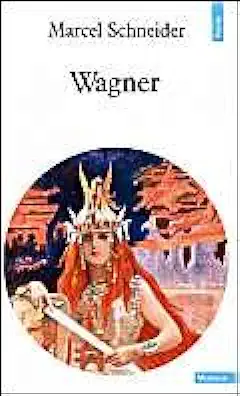
Wagner - Marcel Schneider
Wagner: A Biography
Marcel Schneider's biography of Richard Wagner is a comprehensive and insightful look at the life and work of one of the most influential composers of all time. Schneider paints a vivid portrait of Wagner as a complex and often contradictory figure, a man of genius and vision who was also capable of great cruelty and arrogance.
Early Life and Influences
Wagner was born in Leipzig, Germany, in 1813. His father, Carl Friedrich Wagner, was a police clerk and amateur musician. Wagner's mother, Johanna Rosine Pätz, was an actress. Wagner's early life was marked by tragedy. His father died when he was only six years old, and his mother died five years later. Wagner was raised by his stepfather, Ludwig Geyer, a theater director and actor.
Geyer encouraged Wagner's musical talent, and Wagner began composing at an early age. He studied music at the University of Leipzig, but he left after only two years. Wagner then embarked on a career as a conductor and composer.
Early Career
Wagner's early works were influenced by the music of Beethoven and Weber. His first opera, "Die Feen" (The Fairies), was premiered in 1834. Wagner's next opera, "Das Liebesverbot" (The Ban on Love), was premiered in 1836. Both operas were unsuccessful.
In 1839, Wagner moved to Paris. He hoped to find success in the French capital, but he was disappointed. Wagner's operas were not well-received in Paris, and he was forced to live in poverty.
The Dresden Years
In 1842, Wagner was appointed Kapellmeister (music director) of the Royal Saxon Court Opera in Dresden. This was a major turning point in Wagner's career. Wagner finally had the opportunity to produce his operas on a grand scale.
Wagner's first opera in Dresden was "Rienzi" (1842). "Rienzi" was a huge success, and it established Wagner as a major composer. Wagner's next opera, "The Flying Dutchman" (1843), was also a success.
The Bayreuth Festival
In 1876, Wagner opened the Bayreuth Festival. The Bayreuth Festival was dedicated to the performance of Wagner's operas. The festival was a huge success, and it helped to establish Wagner as one of the most important composers of all time.
Wagner's Music
Wagner's music is characterized by its rich orchestration, its use of leitmotifs (recurring musical themes), and its complex and often experimental harmonies. Wagner's operas are also known for their dramatic power and their exploration of deep psychological themes.
Wagner's Legacy
Wagner's music has had a profound influence on Western music. His operas have been performed all over the world, and his music has been used in films, television shows, and video games. Wagner's ideas about music and drama have also influenced the work of other composers, such as Mahler, Strauss, and Schoenberg.
Conclusion
Wagner was a complex and controversial figure, but there is no doubt that he was one of the most important composers of all time. His music is still performed and enjoyed all over the world, and his influence on Western music is immeasurable.
Why You Should Read This Book
Marcel Schneider's biography of Wagner is a must-read for anyone interested in the life and work of this extraordinary composer. Schneider's book is well-written and informative, and it provides a fascinating look at one of the most important figures in Western music.
If you are a fan of Wagner's music, or if you are simply interested in learning more about one of the most influential composers of all time, then I highly recommend reading Marcel Schneider's biography of Wagner.